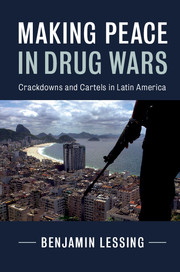Book contents
- Frontmatter
- Dedication
- Contents
- Figures
- Tables
- Preface
- Acknowledgments
- Abbreviations and Acronyms
- 1 Introduction
- PART I A THEORY OF CARTEL–STATE CONFLICT
- PART II CASE STUDIES
- 5 Colombia: Conditionality to Contain a Killer
- 6 Rio de Janeiro: Conditionality, One Favela at a Time
- 7 Mexico: Conditionality Abandoned
- PART III CONDITIONAL REPRESSION AS OUTCOME
- Appendix A Violent-Event Data
- Appendix B List of Interview Subjects
- Bibliography
- Index
- Miscellaneous Endmatter
6 - Rio de Janeiro: Conditionality, One Favela at a Time
from PART II - CASE STUDIES
Published online by Cambridge University Press: 17 November 2017
- Frontmatter
- Dedication
- Contents
- Figures
- Tables
- Preface
- Acknowledgments
- Abbreviations and Acronyms
- 1 Introduction
- PART I A THEORY OF CARTEL–STATE CONFLICT
- PART II CASE STUDIES
- 5 Colombia: Conditionality to Contain a Killer
- 6 Rio de Janeiro: Conditionality, One Favela at a Time
- 7 Mexico: Conditionality Abandoned
- PART III CONDITIONAL REPRESSION AS OUTCOME
- Appendix A Violent-Event Data
- Appendix B List of Interview Subjects
- Bibliography
- Index
- Miscellaneous Endmatter
Summary
In Rio de Janeiro, the 1980s’ cocaine boom coincided with the advent of a new form of organized crime—the prison-based Comando Vermelho (CV) drug syndicate and its rivals—to produce unusually concentrated and territorialized retail markets based in the city's numerous favelas (slums). Police institutions built during authoritarian rule delivered both brutal repression and rampant corruption. The result was an increasingly violent but resilient system of illicit rent extraction and escalating repression, punctuated by a handful of locally successful policy experiments. Starting in 2008, a new strategy, Pacification, significantly altered this dynamic, vastly reducing cartel–state conflict. I make three key claims: (1) Between democratization (1983) and Pacification (2008), the degree of repression varied but trended upward, while conditionality remained low. Syndicates responded to unconditional crackdowns with violent, “fight-and-bribe” strategies. (2) The GPAE policing program (2000–2001) raised conditionality locally, leading affected traffickers to eschew anti-state violence until the program eroded and collapsed. (3) The initial implementation of the Pacification strategy (2008–2012) significantly increased the conditionality of repression at a city-wide scale, leading cartels to eschew anti-state violence. I conjecture that Pacification's initial success and rapid expansion led to an erosion of effective conditionality, contributing to a resurgence of violence since 2013. I discuss the reform processes by which GPAE and Pacification were implemented and the difficulties of sustaining them. I also conjecture that Rio's numbers racket (1940s–1980s) was kept relatively peaceful through a moderately conditional approach.
OVERVIEW
Rio de Janeiro is known as “the marvelous city” for many reasons, including its natural beauty and imperial history, but Rio would not be Rio—socially, culturally, or politically—without its favelas. Over the last hundred years, these squatter communities have spread across rainforested hillsides and muddy mangroves, sprouted amid the high-rises of wealthy beach-front neighborhoods, and filled in vast interior tracts far from the city center. The favelas are the cradle of carioca culture—samba, carnaval, and now baile funk—and home to hundreds of thousands of workers who came to Rio from rural Brazil to build much of the formal city we see today. The favelas are also, tragically, the site of an unusually violent, territorialized, and resilient urban armed conflict.
- Type
- Chapter
- Information
- Making Peace in Drug WarsCrackdowns and Cartels in Latin America, pp. 158 - 201Publisher: Cambridge University PressPrint publication year: 2017



